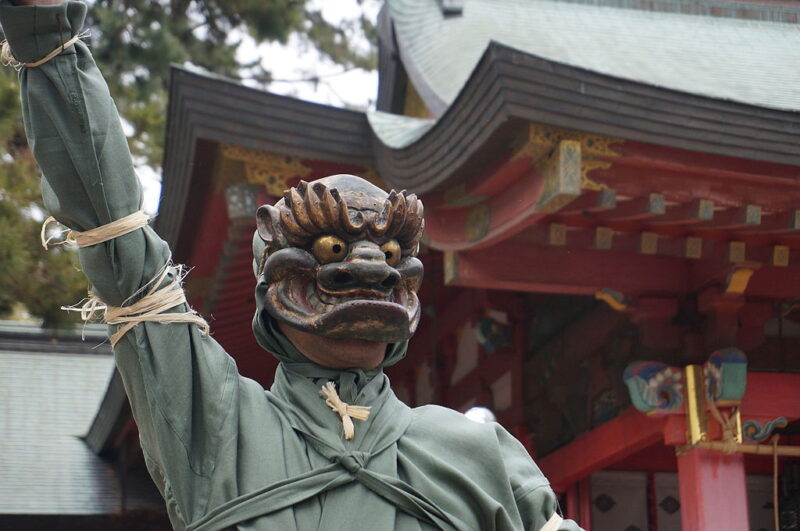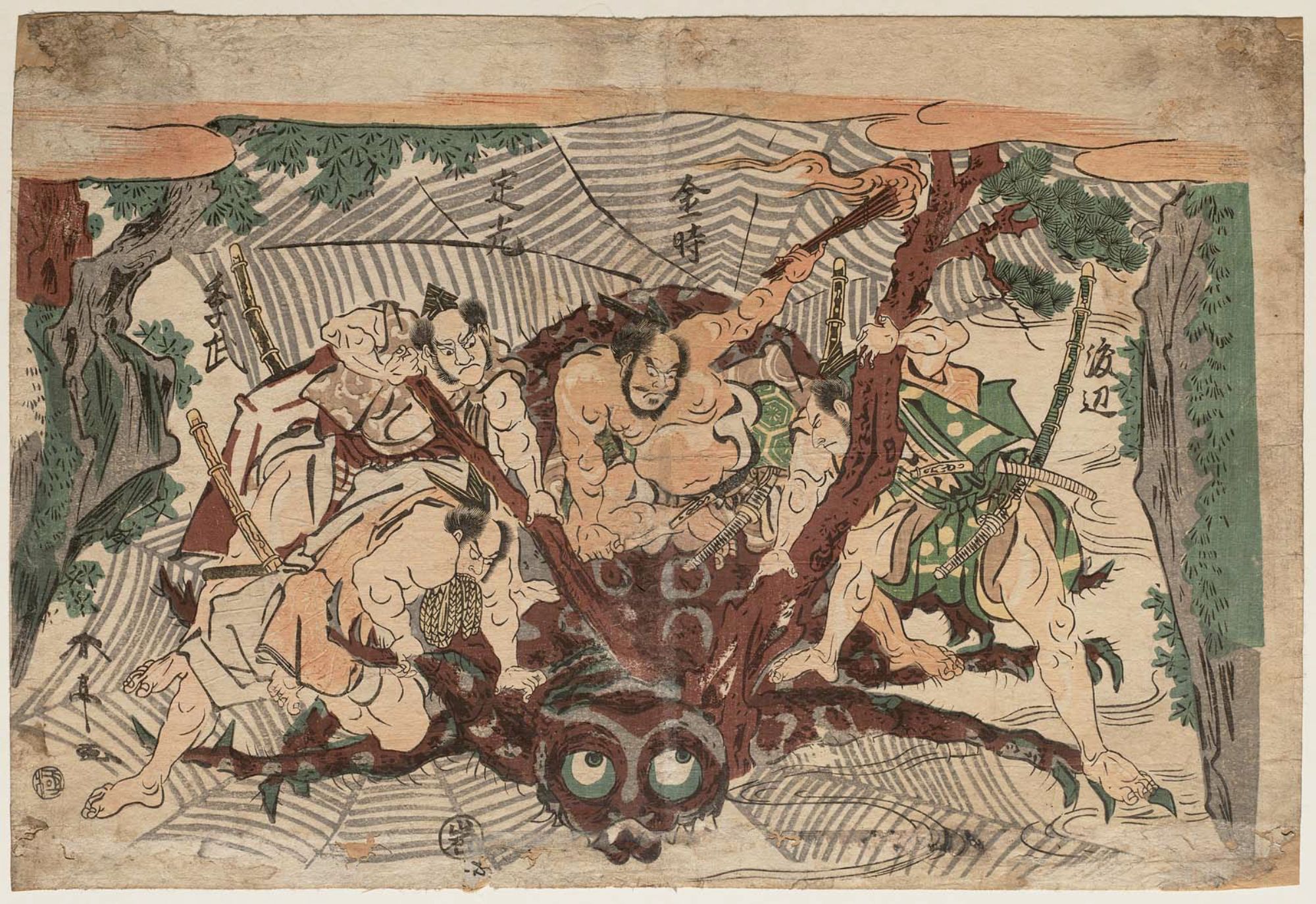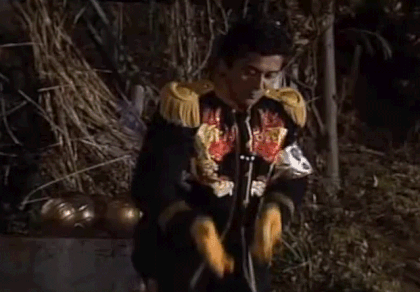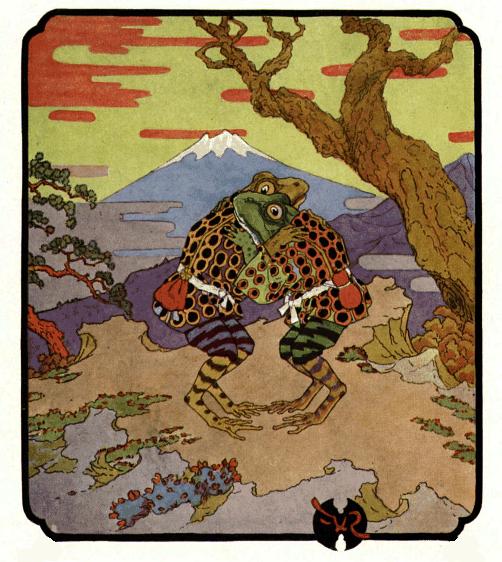To celebrate October (one of my favorite months), I will be posting Japanese folklore in their original English versions. You can find modernized versions of these and other stories in my compilation “Tales from Old Japan.”
When the capital of Japan was the city of Kioto, and the mikado dwelt in it with all his court, there lived a brave captain of the guard named Yorimitsu, who belonged to the famous Minamoto family. He was also called Raiko, and by this name he is best known to all the boys and girls in Great Japan. Under Captain Raiko were three brave guardsmen, one of whom was named Watanabé Tsuna. The duty of these men-at-arms was to watch at the gates leading to the palace.
It had come to pass that the blossom capital had fallen in a dreadful condition, because the guards at the other gates had been neglected. Thieves were numerous and murders were frequent, so that every one in the city was afraid to go out into the streets at night. Worse than all else, was the report that oni or imps were prowling around in the dark to seize people by the hair of the head. Then they would drag them away to the mountains, tear the flesh off their bones, and eat them up.
The worst place in the city, to which the horned imps came oftenest, was at the south-western gate called the Rajo-mon.
To this post of danger, Raiko sent Tsuna, the bravest of his guards.
It was on a dark, rainy and dismal night, that Tsuna started, well-armed, to stand sentinel at the gate. His trusty helmet was knotted over his chin, and all the pieces of his armor were well laced up. His sandals were girt tight to his feet, and in his belt was thrust the trusty sword, freshly ground, until its edge was like a razor’s, and with it the owner could cut asunder a hair floating in the air.
Arriving at the red pillar of the gate, Tsuna paced up and down the stone way with eyes and ears wide open. The wind was blowing frightfully, the storm howled and the rain fell in such torrents that soon the cords of Tsuna’s armor and his dress were soaked through.
The great bronze bell of the temples on the hills boomed out the hours one after another, until a single stroke told Tsuna it was the hour of the Rat (midnight).
Two hours passed, and the hour of the Bull sounded (2 A.M.,) still Tsuna was wide awake. The storm had lulled, but it was darker than ever.
The hour of the Tiger (3 o’clock) rung out, and the soft mellow notes of the temple bell died away like a lullaby wooing one to sleep, spite of will and vow.
The warrior, almost without knowing it, grew sleepy and fell into a doze. He started and woke up. He shook himself, jingled his armor, pinched himself, and even pulled out his little knife from the wooden scabbard of his dirk, and pricked his leg with the point of it to keep awake, but all in vain. Unconsciously overcome, he leaned against the gate-post, and fell asleep.
This was just what the imp wanted. All the time he had been squatting on the cross-piece at the top of the gate waiting his opportunity. He now slid down as softly as a monkey, and with his iron-like claws grabbed Tsuna by the helmet, and began to drag him into the air.
In an instant Tsuna was awake. Seizing the hairy wrist of the imp with his left hand, with his right he drew his sword, swept it round his head, and cut off the demon’s arm. The oni, frightened and howling with pain, leaped up the post and disappeared in the clouds.
Tsuna waited with drawn sword in hand, lest the oni might come again, but in a few hours morning dawned. The sun rose on the pagodas and gardens and temples of the capitol and the nine-fold circle of flowery hills. Everything was beautiful and bright. Tsuna returned to report to his captain, carrying the oni’s arm in triumph. Raiko examined it, and loudly praised Tsuna for his bravery, and rewarded him with a silken sash.

Now it is said that if an oni’s arm be cut off it cannot be made to unite with the body again, if kept apart for a week. So Raiko warned Tsuna to lock it up, and watch it night and day, lest it be stolen from him.
So Tsuna went to the stone-cutters who made idols of Buddha, mortars for pounding rice, and coffers for burying money in to be hidden away in the ground, and bought a strong box cut out of the solid stone. It had a heavy lid on it, which slid in a groove and came out only by touching a secret spring. Then setting it in his bed chamber, he guarded it day and night, keeping the gate and all his doors locked. He allowed no one who was a stranger to look at the trophy.
Six days passed by, and Tsuna began to think his prize was sure, for were not all his doors tight shut? So he set the box out in the middle of the room, and twisting some rice-straw fringe in token of sure victory and rejoicing, he sat down in ease before it. He took off his armor and put on his court robes. During the evening, but rather late, there was a feeble knock like that of an old woman at the gate outside.
Tsuna cried out, “Who’s there?”
The squeaky voice of his aunt (as it seemed), who was a very old woman, replied “Me, I want to see my nephew, to praise him for his bravery in cutting the oni’s arm off.”
So Tsuna let her in and carefully locking the door behind her, helped the old crone into the room, where she sat down on the mats in front of the box and very close to it. Then she grew very talkative, and praised her nephew’s exploit, until Tsuna felt very proud.
All the time the old woman’s left shoulder was covered with her dress while her right hand was out. Then she begged earnestly to be allowed to see the limb. Tsuna at first politely refused, but she urged, until yielding affectionately he slid back the stone lid just a little.
“This is my arm” cried the old hag, turning into an oni, and dragging out the arm.
She flew up to the ceiling, and was out of the smoke-slide through the roof in a twinkling. Tsuna rushed out of the house to shoot her with an arrow, but he saw only a demon far off in the clouds grinning horribly. He noted carefully however that the direction of the imps’ flight was to the north-west.
A council was now held by Raiko’s band, and it was decided that the lurking-place of the demons must be in the mountains of Oyé in the province of Tango. It was resolved to hunt out and destroy the imps.
Reference
Griffis, William Elliot (1887) Japanese Fairy World: Stories from the Wonder-lore of Japan. London: Trubner & Co., Ludgate Hill.



